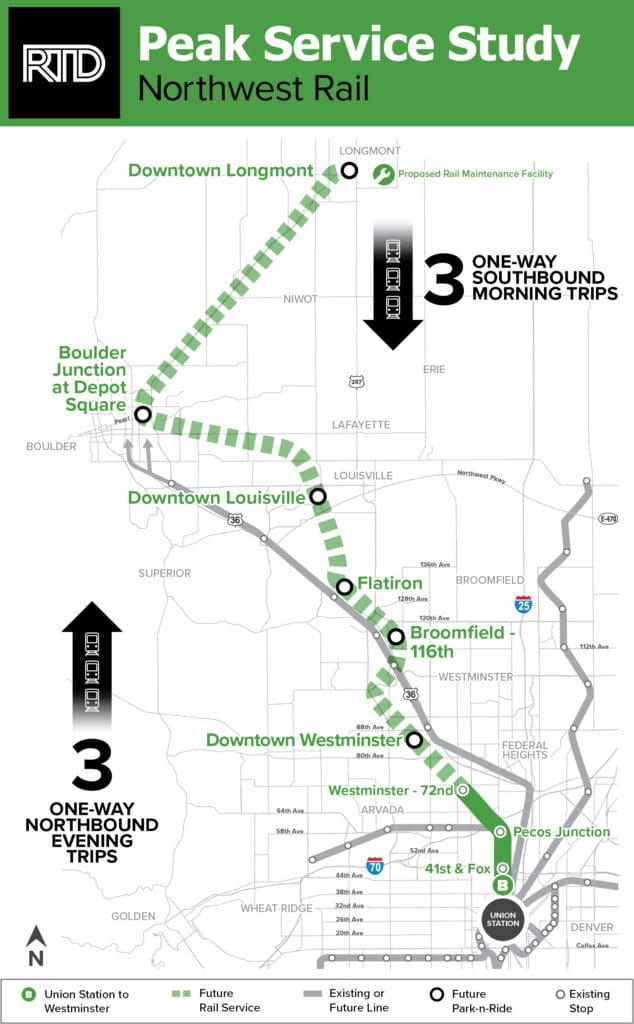Background on the Northwest Rail
Most longtime residents along U.S. 36 are likely familiar with the plan to build a commuter railway from Denver’s Union Station to Boulder and Longmont. The train line is called the Northwest Rail, and it is expected to come to completion in 2050 at the cost of approximately $1.5 billion. Colorado’s RTD intended to construct both a rail from Denver to Boulder and a bus service based on a report from 2001. To those worried by the price tag on this state project, I intend to address some of your concerns about this public good. Commuters from Longmont to Denver deserve a more sustainable option to get to work than the carbon-intensive modes of transportation that we use today.

Where will the money come from?
So far, RTD officials have put forward a few solutions for funding upcoming projects like the Northwest Rail extension. The full service project would likely cost another $1.5 billion, but a barebones service would cost significantly less while also getting the train online before 2042. Residents have been paying a sales tax to fund the B Line since 2004, and this would likely help support funding of the rail going forward. However, the reduced service would open up the line and cost half the amount of the full service B Line. Other possibilities for funding lie in the Biden administration’s infrastructure package or another tax increase. Greater funding would allow the project to be completed sooner, and start the B Line on funding itself.
Sustainability and Health
Those living on the U.S. 36 corridor are certainly familiar with the traffic jams during people’s commute to and from work. These jams are not only a nuisance for everyone that has to deal with them on their ride to work, but they are also a health hazard for those who are chronically exposed to the exhaust fumes from roadways.
With climate change ever-present in the minds of many Americans, many commuters are looking to find more ways to find ways to make their day more sustainable. The EPA estimates that 27% of greenhouse gas emissions originate from the transportation sector. The commuter vehicles that we use to drive to and from work are not something that can be sustained in the long term if we reasonably want to combat climate change. Massive cities like Tokyo, Japan move millions of passengers each day, largely because the metro system is the most accessible form of transportation in the city. By making such an option more available, more passengers will take advantage of system, but it first needs to be accessible for riders.
A Boon to the Economy
Service into Boulder would benefit businesses along stops on the Northwest route by bringing people without access to vehicles into the labor market. It also allows businesses to tap into greater consumer bases, offsetting the cost of a sales tax increase on businesses.
Originally, RTD estimated that the B Line would service around 10,000 passengers each weekday, but new estimates with a scaled down service put it at 1,400. This estimate comes from a new, cheaper service that RTD plans to offer that will run 3 trains (6 total) during peak commuting hours. While this doesn’t seem like many riders, this plan will allow RTD to institute much of the necessary infrastructure for the B Line, gaining revenue in the process to fund its expansion.
Easing Housing Pressures
Many Boulderites take issue with the ever-increasing cost of housing in the city. By opening up a commuter line, students and workers in Boulder can participate in the city without extensively driving up costs. Many of the people experiencing homelessness on the Front Range are from the area. Easing these pressures would take some of the pressure off of already overburdened government initiatives to provide for the homeless populations in the area. With housing costs being lower and a greater number of commuters, businesses will have access to a greater labor market. This measure will prevent more housing developments from going up that obstruct the view while also allowing businesses to meet labor demands in the Denver-Boulder area.
Pushing for More
Residents living along the planned the B Line’s planned route should push for more transparency with the cost of the line. Moreover, residents need to push for the completion of the line since they have been facing the costs of the line since they have been feeling the costs of this since 2004. Constituents have been paying on this project far too long to abandon it, and commuters deserve a more sustainable option for their commute.
